|
PD4ML Probe
PD4ML Probe tool is a cross-platform GUI tool, built on the top of PD4ML HTML-to-PDF converter library.
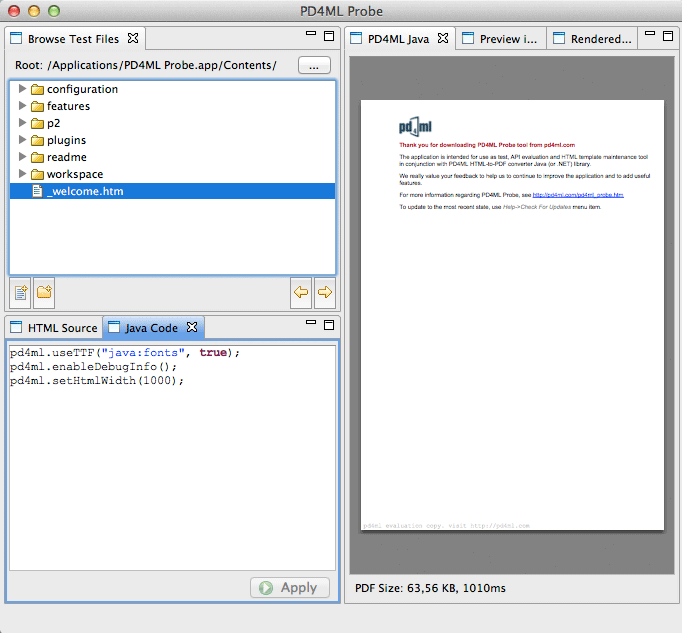
With the tool you can evaluate PD4ML, get familiar with PD4ML API, refine your HTML templates to be
compatible with PD4ML's HTML/CSS renderer specifics. The tool allows you to
compare PDF output of multiple PD4ML versions and, for example, to consider a necessity to upgrade
your productive environment to the most actual converter library state.
PD4ML Probe is available for purchase as a standalone product. Also it is supllied with PD4ML Volume DMS and PD4ML Source Code licenses (purchased after 14.02.2014)
1. Installation and update
Download PD4ML Probe from here or from
PD4ML software download area.
There are versions for Mac OS X (64bit) and Windows (32bit and 64bit)
instantly available. Binaries for other platforms like Linux, Solaris (and others
if supported
by Java SWT) can be built by request.
The tool requires JDK 1.6+ on the target platform. JRE is not sufficient, as
PD4ML Probe utilizes Java compiler API for dynamic Java code snippets compilation.
1.1 Mac OS X
Starting with Mac OS X "Lion" (10.7), the Java runtime is no longer installed automatically as part of the OS installation.
If it is still not on your workstation, it can be obtained, for example, by the
following link:
http://support.apple.com/kb/DL1421 or lookup a newer version.
After the Java is installed double click on the downloaded DMG file
and drag PD4ML Probe icon to Applications.
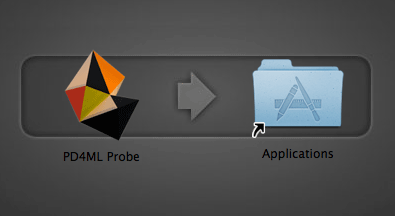
By the first launch PD4ML Probe will prompt you for a serial number.
Apply for a trial one by the given link:
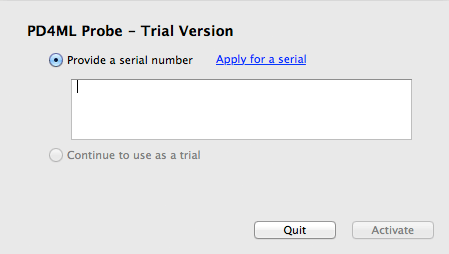
or purchase a license.
After you received an email with serial number and activated the application,
go Help->Check For Updates to bring the tool to the most actual state.
Now the application is ready to be used. Change the document root from the
default (the application home) to a folder of your choice, where you plan to
maintain HTML documents and templates.
1.2 MS Windows
Download Pd4mlProbeInstaller.exe or Pd4mlProbeInstaller64.exe
depending on your Windows type and run it. The installer application will lead
you through quite usual installation procedure. In some cases the installer
requires you to explicitly give administrative rights to write data to
Program Files directory.
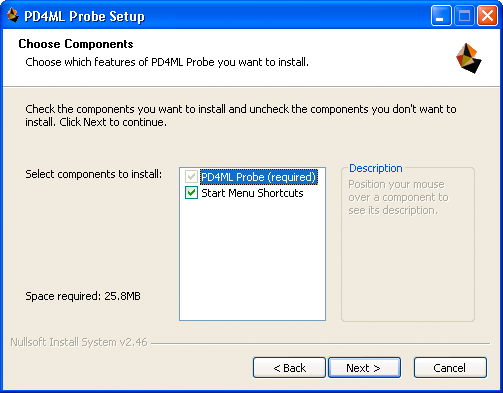
At some point the installer scans the registry for JDK 1.6+ location. If the
info is missing there, it prompts to manually point to a Java home.
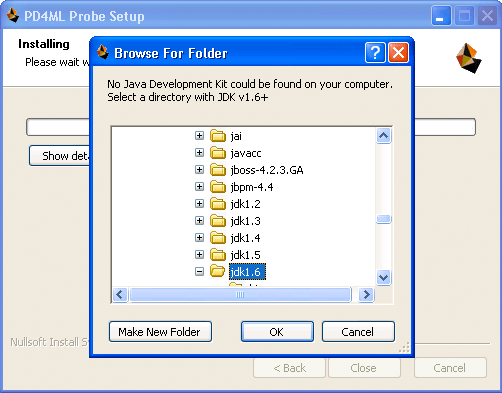
If you chosen a wrong directory by the step, you may correct the mistake
later in PD4ML Probe.ini file.
By the first launch PD4ML Probe will prompt you for a serial number.
Apply for a trial one by the given link or purchase a license.
After you received an email with serial number and activated the application,
go Help->Check For Updates to bring the tool to the most actual state.
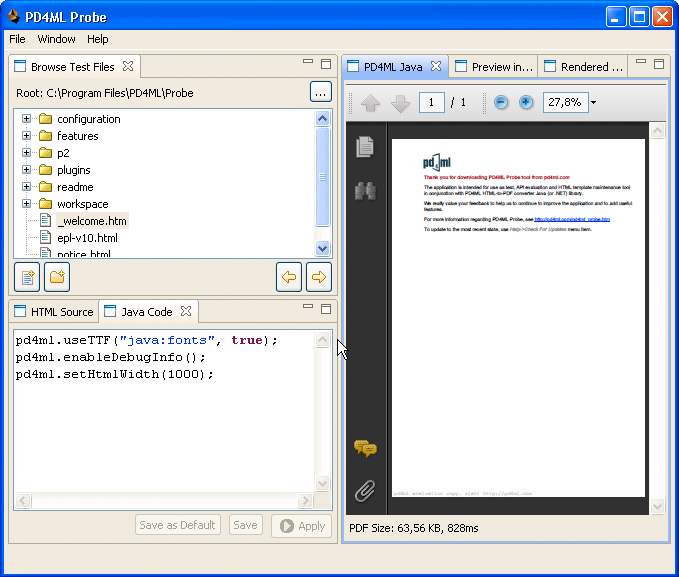
Now the application is ready to be used. Change the document root from the
default (the application home) to a folder of your choice, where you plan to
maintain HTML documents and templates.
2. Features
2.1 Navigation and preview.
PD4ML Probe inherits application and GUI framework from Eclipse/SWT and
supports the major features, probably already familiar to you. You may open or
close particular views, combine them to groups, position the groups in different
regions of the main application window, minimize the groups. If any View is
closed by mistake, it can be re-opened via Window->Show View menu
command.
The main view is the navigation pane "Browse Test Files". Any selection
change in the pane impacts all other opened views: it opens a selected file in
HTML and Java editors (Java code is stored as a comment in HTML file), it forces
embedded browser and PDF previewers to show a rendered/converted file.
The navigation view pre-reads all .htm, .html and .dxl
file names into a tree structure. The structure (or a part of it) can be
refreshed from a context menu accessible by a right mouse click.
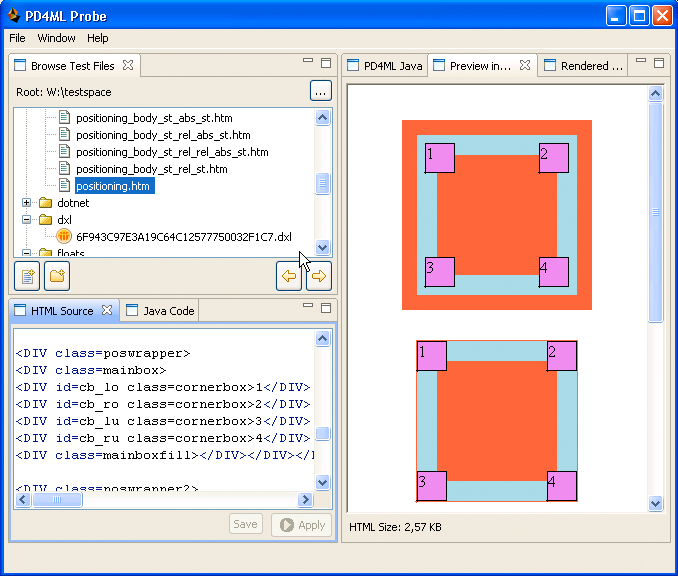
"Preview in Browser" view embeds a regular web browser. On Mac OS it is
Safari, on Win it is MS Internet Explorer. Also PDF viewers use the
browser component to show PDFs, so it is expected the browsers have PDF plugins
correctly installed.
The arrow buttons change a selection to next or previous documents, opening
nested folders where needed. The same can be achieved by the keyboard arrow
buttons, but in some environments the browser view captures focus - so an
interaction with the mouse is needed.
A meaning of "New folder" button is obvious. "New document" creates a new
HTML from the default template.
The view can be positioned for face-to-face comparison, for example, of HTML
rendered in the browser and converted to PDF:
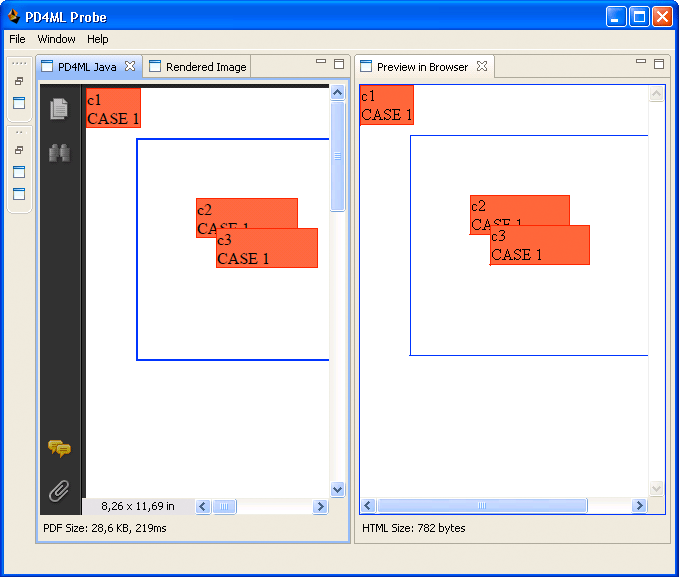
If a resolution of your monitor allows, you may open as many views as you
wish the same time.
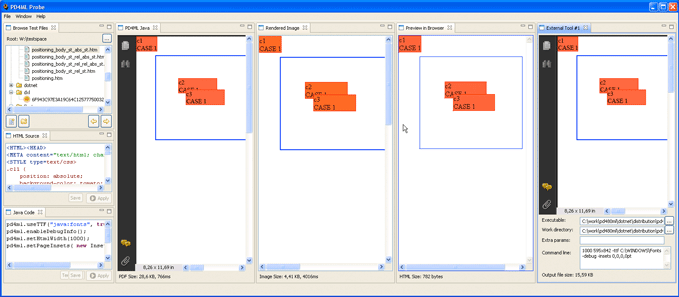
(Note: the PDF layout looks smaller because of the zoom factor
of the PDF viewer)
As told above, a selection change in the navigation page will update all the
opened views which makes convenient to visually check the rendering/conversion
quality.
PD4ML probe includes evaluation version of PD4ML Java library. The library is
used to generate PDFs (shown in "PD4ML Java" view) and images ("Rendered Image"
view). The actual library version number can be found in PDF document properties
(right mouse click to a generated PDF).
The newest versions will come with PD4ML Probe software updates.
If you need to use a particular version, you may copy its pd4ml.jar to
$PD4ML_PROBE_HOME/plugins/org.zefer.pd4ml.libs_xxxx/lib
PD4ML Probe can also preview Lotus Notes DXL files as PDF:
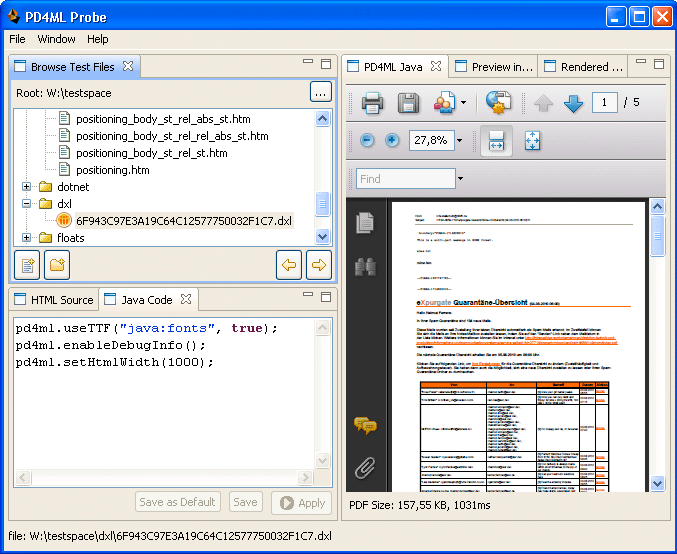
In order to achieve that, DXL is initially transformed to HTML with an XSLT stylesheet.
2.2 HTML and Java editors
PD4ML probe implements simple HTML and Java code editors with syntax
highlighting. Any changes done in HTML document source or in Java code instantly
impact relevant views.
Initially HTML is converted to PDF with the default PD4ML API calls. But the
default Java code can be extended and overridden. The HTML-test-case-specific
code is stored to the corresponding HTML file as comments.
Java code editor also implements a very basic content assist ("auto-complete"
feature). If a particular code line starts with pd4ml, by Ctrl-Space
it offers PD4ML class API methods to insert.
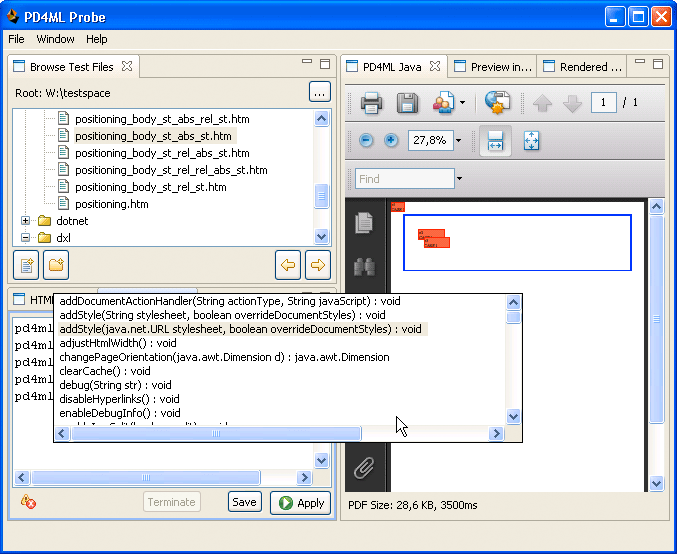
PD4ML Probe by any Java code change, pre-compiles it in memory and highlights
syntax errors if any:
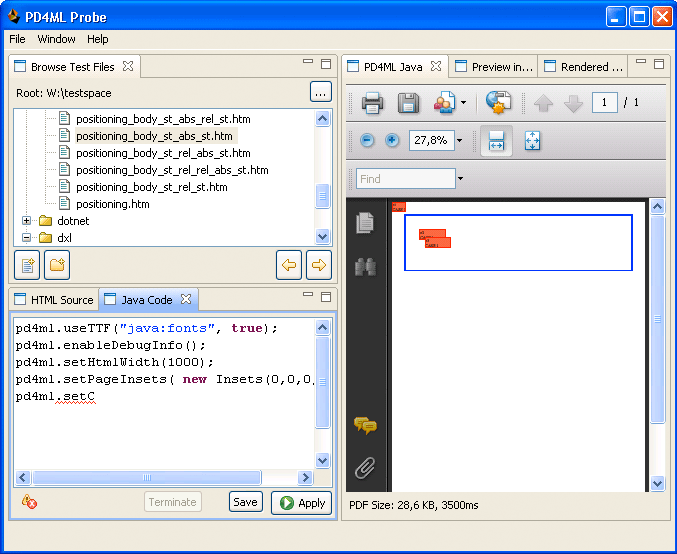
A mouse pointer, moved over the error icon in the left bottom corner pops up
a balloon with the compiler error message.
2.3 External converters
As we mentioned above PD4ML Probe already has a PD4ML Java library built-in.
But what to do if you want to test another version or PD4ML Java or even
PD4ML .NET?
There are 2 special views, named External Tool #1 and
External Tool #2.
The views communicate with external command-line tools and represent their
PDF output. The command line syntax must be compatible with
Pd4Cmd and its
.NET port pd4net.exe
If you need to configure .NET version of PD4ML as an external tool, you need
to choose pd4net.exe (part of PD4ML .NET distribution) as an executable:
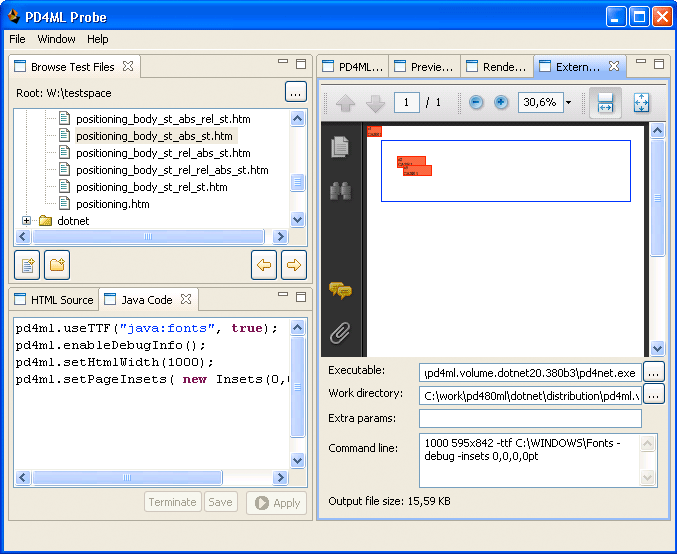
The working directory will be automatically set to pd4net.exe
location. The command line is auto-generated from Java API calls in the Java
Code editor (substituting some .NET-unfriendly paths like "java:fonts" with
common ones).
If you wish to configure PD4ML Java library as an external tool, you must
specify JVM binary (java.exe, for instance) as an executable and choose
pd4ml.jar location as a work directory.
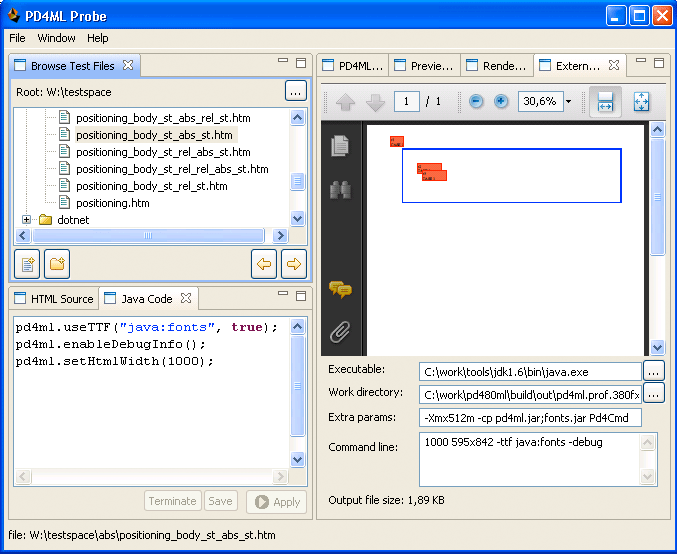
PD4ML Probe adds Java-specific extra parameters.
3. Troubleshooting
- Error Messages view - to be used to monitor conversion errors.
- Genaral instability.
Go to the application home directory, open
PD4ML
Probe.ini in a text editor and change javaw in the second line to
java. The change forces Java to start with a console open. Check the
console output for error messages or exception stack traces.
Note: on Mac OS it is a bit tricky to get the application home. You would
need to go to Applications folder, right click on PD4ML Probe.app
and choose Shop Package Contents. Then go to Contents/Mac OS.
- After a serial number entering, the application quits. The Java
console (if opened) disappears too quickly to read what wrong there.
Most probably the application has no permissions to write to the application
home directory. Change the directory permissions or ownership using the
standard OS means or set PD4ML Probe to "run as administrator" (in the
application security properties).
New in version from Dec. 06, 2012
- Most actual state of included PD4ML library
- Improved Java code error highlighting
- Support of predefined header and footer objects
(PD4PageMark)
- Improved Java editor auto-proposal logic for predefined pd4ml,
header and footer objects.
- A variety of usability improvements
New in version from Jul. 15, 2013
- Trial PD4ML library v3.8.5 included
- New RTF pane to preview HTML->RTF and DXL->RTF conversion results (embeds WordPad or MS Word as OLE objects; Windows platform only)
- For "Preview in Browser" pane, DXL is XSL-transformed to HTML
How to get the newest version? Download the base version by a link
below and follow "Check for software updates..." menu instructions.
|